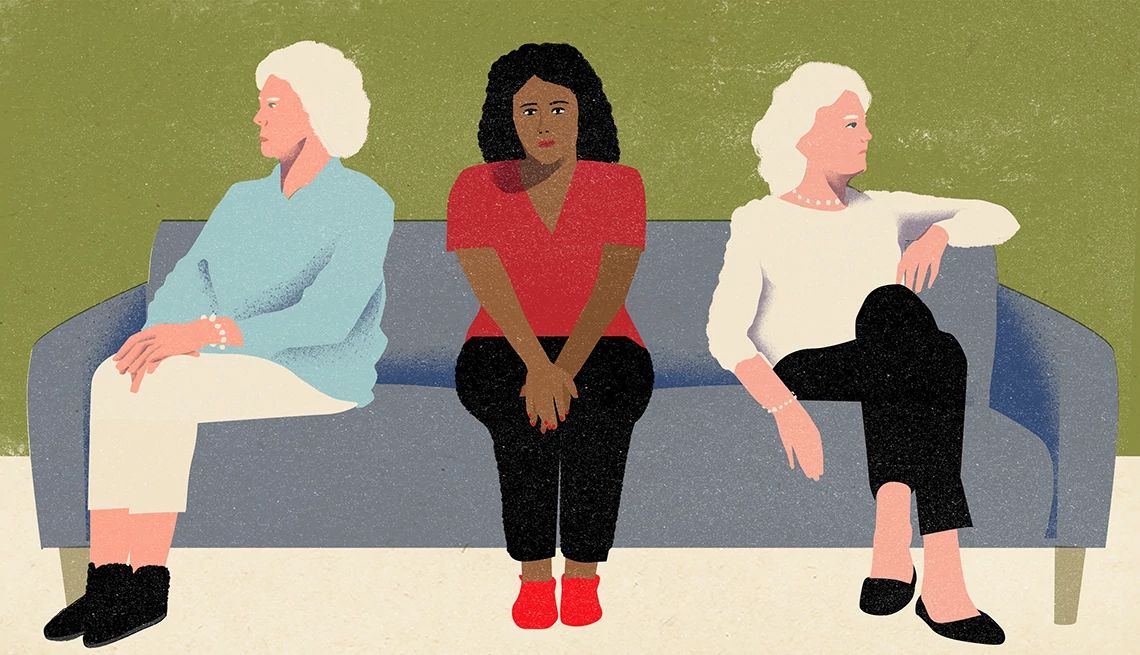AARP Hearing Center


Sarah Ferguson* had a close relationship with her only sister until their mother’s health declined and her sister became involved with a man who seemed more interested in their mother’s money than in her well-being.
“It just got very ugly when he was in the picture and he was trying to, I think, keep [my sister] away from me and my family,” explains Ferguson, 59.
“I think they both thought there was a pot of money somewhere that I had access to, so they didn’t see my mom the last year of her life.”
Ferguson believes the root of her sister’s discontent was the fact that Ferguson and her husband had bought their mother’s house, adding a wing for her, and then caring for her there over the last 12-15 years of her life.
“[My sister] just always seemed sort of unhappy about that. ... I don’t know what I would have done differently looking back. It’s hard to know, because I felt like I was doing things in good faith.”
Expectation and obligation
Conflict around caregiving is not unusual, especially between sisters, says Megan Gilligan, Ph.D., an associate professor of Human Development & Family Science at the University of Missouri. Gilligan is a co-author of the longitudinal Within-Family Differences Study that looks at understanding the “relationships between parents and their adult children and grandchildren, as well as between siblings in adulthood.”
Gilligan and her colleagues found that sisters tend to be more critical of one another than sons when it comes to parental caregiving.
“Daughters are raised with a sense of expectation, obligation, of wanting to provide that care and wanting that care to look a certain way,” she explains. “And we found that when multiple daughters were involved in care, maybe sometimes they’re kind of stepping on each other’s toes whereas … sons were more likely to kind of step back and let sisters navigate that,” she says.
Interestingly, Ferguson wasn’t the one to break off the relationship with her sibling. One month after their mother’s death Ferguson says, “[My sister’s] boyfriend wrote me a letter saying, ‘I’m writing this with your sister. She hates you. She’s always hated you.’ … So I just said, okay, we just need to go our separate ways for now.”
Ferguson has mixed feelings about the split. While she misses her sister and her children’s opportunity to have a relationship with their aunt, the toxicity of those last few years around their mother’s death gives her pause. Now, she reaches out about once a year via email and wishes her well, but otherwise is at peace with the estrangement.
Reduce friction
Gilligan suggests that we replace the idea of equality with equity in caregiving. Siblings should ask what the parents want each child to do and then divide that work equitably if not equally in order to reduce sources of stress for the ailing parent and among siblings.
She and other experts say the key to reducing family friction in this context is for parents to clearly and definitively make their wishes known early and in writing.
“A lot of this can be dealt with in terms of the tangible things prior to death,” says Daniel G. Blazer, M.D., a professor emeritus of Psychiatry and Behavioral Sciences and senior fellow in the Center for the Study of Aging and Human Development at Duke University. “And I think if a parent is alive — and I mean awake and aware — that probably should be done. Now, quite honestly, I think sometimes parents kind of have that little evil eye in their mind, saying, ‘Well, let them fight it out.’ And that’s not good, but nevertheless, I think a lot can be solved ahead of time.”
































































More From AARP
Why We Should Normalize Therapy for Grieving Caregivers
Losing a partner can leave you feeling lonely, depressed and heartbroken. Don't go it alone10 Common Mistakes That Family Caregivers Make
Experts share how to avoid these caregiving pitfallsHow to Write ‘The Letter’ to Uncooperative Sibling Caregivers
Make a straightforward appeal for assistance with a loved one